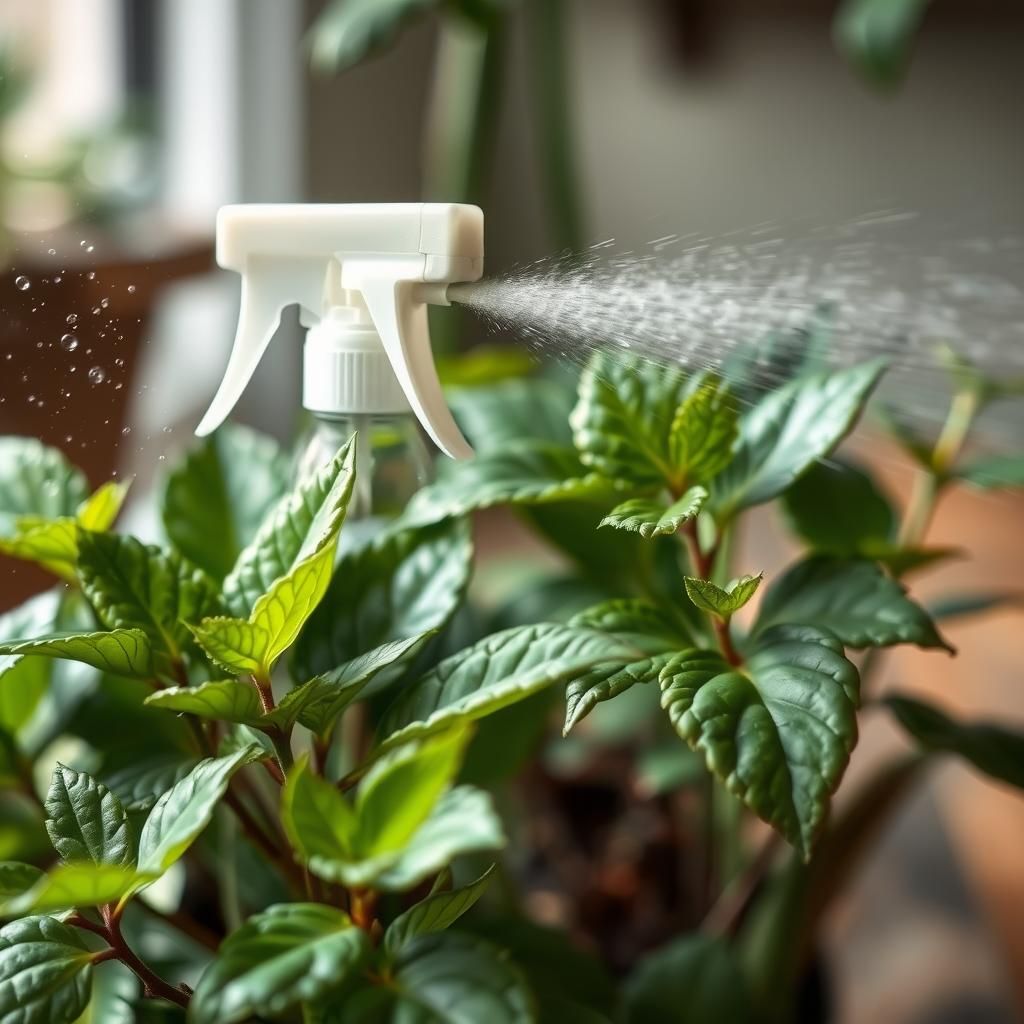Can You Spray Washing Up Liquid on Plants? Expert Tips and Precautions

When it comes to caring for our plants, many of us seek effective yet safe methods to keep them healthy and pest-free. One common question that arises is whether washing up liquid can be used as a spray on plants. This article delves into the potential benefits and risks associated with using washing up liquid in your gardening routine. We'll provide expert tips on how to use it safely, as well as precautions to consider to prevent harm to your plants. Understanding these factors can help you make informed decisions for a thriving garden.
Can You Spray Washing Up Liquid on Plants?
Spraying washing up liquid on plants can be a topic of debate among gardeners. While some people suggest that a diluted solution of washing up liquid can act as an effective pest control measure by suffocating insects, others warn that the surfactants found in dish soaps may harm plant foliage or disrupt beneficial insects. It is crucial to use a mild, grease-cutting formula, avoid any soaps with added fragrances or antibacterial agents, and conduct a patch test on a small section of the plant first. Always dilute the soap properly, typically mixing a few drops of washing up liquid with water to minimize potential damage to your plants.
What Ingredients Should I Avoid in Washing Up Liquid?
When considering using washing up liquid for plants, it is important to avoid ingredients such as fragrances, dyes, and antibacterial agents. These additives can be harmful to plants and beneficial insects, potentially causing burns or toxicity. Look for natural, biodegradable options that contain no harmful chemicals, as they are less likely to adversely affect your garden.
How to Properly Dilute Washing Up Liquid?
To use washing up liquid safely on plants, proper dilution is key. A general guideline is to mix about 1 teaspoon of washing up liquid with 1 quart (approximately 1 liter) of water. This creates a gentle solution that can help manage pests without risking damage to the plant. Always stir well to ensure an even distribution of the soap throughout the water before applying it to your plants.
Can It Help with Pest Control?
Yes, a diluted solution of washing up liquid can aid in pest control by suffocating soft-bodied insects, such as aphids, spider mites, and whiteflies. When sprayed directly onto these pests, the soap can disrupt their outer protective layer, effectively immobilizing them. However, it’s essential to reapply the solution regularly and monitor the plants for any adverse effects, as excessive use may lead to leaf burn or plant distress.
See also:
Is It Safe for All Plants?
While many plants can tolerate a diluted washing up liquid solution, it is not safe for all. Sensitive plants, such as some ferns or delicate herbs, may suffer from leaf damage or chemical burns. It’s advisable to perform a patch test by applying the solution to a small, inconspicuous area of the plant and waiting 24 hours to see if any adverse reactions occur.
How Often Can I Apply It?
The frequency of application largely depends on the infestation level and the plants' response. Generally, it is safe to apply the diluted washing up liquid solution every 1 to 2 weeks. However, if you notice any signs of stress or damage on your plants, it is best to suspend use and explore alternative methods of pest management.
| Aspect | Recommendation |
|---|---|
| Ingredients to Avoid | Fragrances, dyes, antibacterial agents |
| Dilution Ratio | 1 teaspoon per quart of water |
| Pest Types | Aphids, spider mites, whiteflies |
| Application Frequency | Every 1-2 weeks |
| Patch Test Period | 24 hours |
Understanding the Use of Washing Up Liquid on Plants
Spraying washing up liquid on plants can be an effective method for controlling pests like aphids and spider mites, but it is crucial to understand both the benefits and potential risks involved. The surfactants in dish soap can break down the protective waxy layer on pests, making them more vulnerable to extermination. However, using it incorrectly, such as in high concentrations or on sensitive plants, can lead to phytotoxicity, causing leaf damage or plant stress. Always dilute the soap properly, perform a patch test on a small area first, and closely monitor your plants for any adverse reactions after application.
Benefits of Using Washing Up Liquid on Plants
Using washing up liquid as a pest control solution can be beneficial due to its affordability and availability. It serves as a natural alternative to chemical pesticides, reducing the chemical load in your garden. The soap works by suffocating soft-bodied insects, making it a handy tool for organic gardening. By killing pests effectively, it helps to maintain the health and vitality of your plants, leading to increased growth and productivity in the garden.
How to Properly Dilute Washing Up Liquid for Plant Use
To avoid harming your plants, it is essential to dilute washing up liquid properly before application. A recommended ratio is mixing 1 to 2 tablespoons of soap per gallon of water. This dilution ensures that the solution is effective in dealing with pests while being gentle enough not to damage the leaves. It is advisable to stir the mixture well to ensure that the soap is fully integrated into the water, creating an even solution that can be sprayed uniformly on the affected areas.
See also:
Precautions When Using Washing Up Liquid on Plants
When incorporating washing up liquid into your plant care routine, certain precautions should be taken to prevent adverse effects. Avoid applying the solution during hot hours of the day, as this can lead to leaf burn due to increased evaporation. Additionally, always test a small section of the plant first to check for any potential negative reactions. If you notice any signs of stress, such as wilting or discoloration, discontinue use immediately to protect the overall health of your plants.
Alternative Solutions to Washing Up Liquid
If you're concerned about the potential effects of washing up liquid on your plants, you can explore some alternative pest control methods. Options like neem oil, insecticidal soaps, or garlic spray can be just as effective without the risks associated with household soaps. These alternatives are often derived from natural ingredients, making them suitable for organic gardening. Additionally, implementing physical barriers or attracting natural predators can help manage pest populations without any need for chemical interventions.
Signs of Damage from Washing Up Liquid on Plants
It is essential to monitor your plants after using washing up liquid to identify any potential signs of damage. Look for indicators such as leaf burn, discoloration, or a general decline in plant health. Symptoms like curling leaves or stunted growth can signal that the soap solution was too concentrated or that the plant is not suited for this type of treatment. Timely recognition of these signs can help you take action to mitigate further damage and restore your plants' health.
Questions from Our Readers
Can I use washing up liquid on my plants?
Using washing up liquid on plants is generally not recommended. While it is often used as a natural insecticidal soap, regular dish soap can contain additives and chemicals that may be harmful to plant health. It's crucial to use a product specifically designed for plants to avoid damaging them.
What type of washing up liquid is safe for plants?
If you choose to use washing up liquid, opt for a gentle, biodegradable soap with no added fragrances or dyes. Look for products labeled as safe for gardens or those that list natural ingredients to minimize the risk of harm to your plants.
See also:
How should I apply washing up liquid to plants?
When applying washing up liquid to plants, dilute it properly with water to reduce potential harm. A common mixture is 1 tablespoon of soap to 1 quart of water. It’s best to test on a small section of the plant first to ensure there are no adverse reactions.
Are there any alternatives to washing up liquid for pest control?
Yes, there are many natural alternatives to washing up liquid for pest control on plants. Options such as neem oil, castile soap, or a mixture of water and vinegar can effectively deter pests without the risks associated with dish soap. Always ensure these alternatives are also safe for your specific plants.

If you want to read more articles like Can You Spray Washing Up Liquid on Plants? Expert Tips and Precautions, we recommend you check out our Plants category.
Leave a Reply
Related Articles